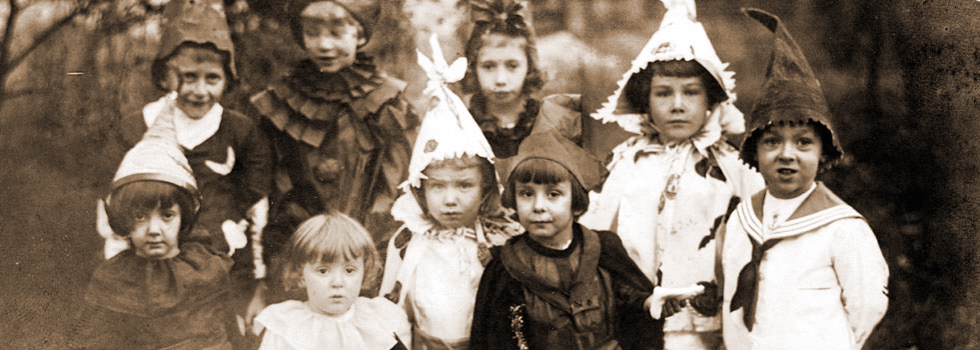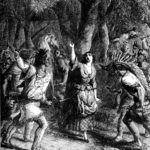On July 13, 1782, in one of the last incidents of the Revolutionary War, British soldiers and Indians attacked and burned Hannastown. Judge Robert Hanna’s wife, Elizabeth Kelly, and two of their daughters were taken prisoners by the Indians. The women were taken to Montreal, held for a time as their Indian captors debated their fate, then, at the behest of a traveling Episcopal minister, were sold to British soldiers as prisoners in exchange for a keg of rum or corn whiskey, and released the following spring when peace was declared.
No written account of their captivity exists, but another woman named Elizabeth Brownlee, who was abducted with them, left something of a first hand account of her experience in a February 5, 1829, petition to the Pennsylvania State Legislature for financial support after her second husband’s death.
Pension File for Elizabeth Brownlee Guthrie, #3245 PA
Pennsylvania State Archives RG-7 Records of the GENERAL ASSEMBLY Series Descriptions Petitions and Miscellaneous Records, 1776-1790
Elizabeth Brownlee gives an account of the burning of Hannastown, and her experiences as a captive in her petition to the PA. State Legislature.
PP410.
The petition itself has been lost but appeared verbatim in the Westmoreland Democrat on May 29, 1899.
“That your petitioner was born in the city of Londonderry, A.D. 1755; that she emigrated to this country with her father, John Guthrie, in the year 1771; that in less than one year thereafter, the said John Guthrie, with his family moved to Westmoreland county, settled near Poke Run; (then beyond the frontiers;) had no other neighbors than the savage nations, and during the time of what is called “Dunmore’s war” was frequently obliged to fly to Hannastown fort. In 1775 she married Joseph Brownlee, then a lieutenant in Captain Irwin’s company of riflemen. Shortly after the company was called to the state of New Jersey, Lieutenant Brownlee, her husband, was taken prisoner at the battle of Long Island: he was afterwards exchanged and annexed to Colonel Broadhead’s regiment, marched to the Big Island in the Susquehanna, and to Wyoming, where they routed the Indians from their hiding places and then returned to Carlisle; from thence they were ordered to Fort Pitt, thence down the Ohio to the place where Fort Lawrence stood, which fort they erected. At this place a party under the command of Lieutenant Brownlee were sent as a scout after the Indians, when he got a stab in his foot, which disabled him from performing any other active service. He then returned home and resided with his wife (your present petitioner) near Greensburgh, until the burning of Hannastown by the Indians. He was then at Miller’s fort, about two miles distant, and with most of the settlers in the neighborhood endeavored to make their escape; he, with his son in his arms, your petitioner with a child at her breast, and a number of others, who were overtaken by the savages, at the sight of whom Mrs. Hanna exclaimed, “O, Captain Brownlee!” The savages on hearing his name, instantly fell upon him and murdered him and his son, together with nine other persons; petitioner, her infant and the aforesaid Mrs. Hanna, only escaping their murderous tomahawks. Your petitioner with her little child in her arms was dragged along as prisoners.
Her suffering during thirteen days march through the wilderness of that country, can be better conceived than described, at which time they arrived at Cateragus, with several prisoners from various places, when she was kept two weeks on the pith of young cornstalks, of which she had but a small quantity allowed her daily. She was marched from Cateragus to Buffalo, during which period she was taken with the fever and ague, when a council was called to determine on the mode of putting her to death! At this council was a white man who had the command of a party of Indians, who was called Capt. Lottridge. He told them that she was so far reduced that she could afford them no amusement in dying by any mode of torture they could inflict; but advised them to take her to Niagara and exchange her for rum, and that would afford them more amusement than her death could possibly do—his counsel was adopted and her life spared. They remained at Buffalo nearly four months in a very low state of health, uncomfortable lodgings and scant provisions. Before she could be removed to Niagara, where she was about to be removed, they found she was unable to carry her child; but they tied it on her back, gave her a stick and in that manner drover her along before them past Fort Slusher on to Niagara, where they sold her for 20 dollars and 2 gallons of rum and her child for 10 dollars.—Being purchased by a British officer, she was taken in his family and attended to in such a manner that in two weeks her health was so far restored that she was put on board a vessel and taken to Carlton Island, in Lake Ontario—was then put on board of an open boat and after traveling two cold days in the month of November she arrived in a perishing condition at Montreal. There she was kept prisoner seven months and compelled to live on musted meal and stinking meat until peace was declared and a general exchange of prisoners took place. She was then, with many others, sent to St. John’s on the Sorrel river, thence by Crown Point to Ticonderoga, where an American officer received the prisoners. She then returned by Skeensborough, Saratoga, Fort Anne, Fort Edward, the Half Moon Battery, Albany, New York, Philadelphia, & to the ruins of Hannastown, in the county of Westmoreland, emaciated, sickly, without the consolation of her husband, without money, without friends, who could afford her relief, her house and furniture burned by the savages, together with all her husband’s papers and accounts. She supported herself and child by her own industry for two years, at the expiration of which time she married Capt. William Guthrie, who then commanded a company of rangers, for the protection of the frontiers, until peace was fully and finally established. His habits of life were not well calculated to make a comfortable living by farming, and he was unable to commence any other business consequently he remained in great want of the indispensable necessaries of life, until he obtained a pension a few years since from this commonwealth. But through an accidental fall of a wagon a few months ago from a high bridge, he was killed.
Thus, your petitioner is now left in her old days destitute of everything that could make her comfortable in this world. She therefore prays your honorable body to grant her the same pension which was received by her late husband. And she will ever pray, &c.
Elizabeth’s petition to the Harrisburg legislature was successful. On March 23, 1829, the Pennsylvania Assembly authorized the state treasurer to pay 60 dollars immediately, and an annuity of 60 dollars, payable half yearly during her life.
After William Guthrie’s death, Elizabeth lived on a farm with her son, Joseph Brownlee Guthrie, until her death in 1842.
Published Accounts
Elizabeth’s experience has been the subject of several books, as listed below:
A Captive’s Tale: The story of Elizabeth Brownlee Guthrie by Anna Warren. Greensburg, PA: Westmoreland County Historical Society, 1977
Joseph Brownlee and the Destruction of Hannastown by Betty Rudolph. Excerpt:
On July 13, 1782 Joseph Brownlee and his family were attending a wedding at Miller’s Blockhouse at Hannastown in Westmoreland Co. PA when the Indians attacked. Several of the guests, including the Brownlees, were captured. One of the captured women happened to address Joseph by name. The Indians, upon finding out who he was, killed him with a hatchet blow to the head, and then killed his three-year-old son John who he was carrying on his back. The Indians also killed another woman, identified in one account as Mrs. White, assuming she was Joseph’s wife.
Elizabeth and Jane, who was only four months old at the time, were taken to Buffalo and Niagra where Elizabeth was sold to British officers for $20 and Jane for $10 and 2 gallons of rum. They were then taken to Montreal and exchanged and returned to Hannastown in July 1783. The bodies of the slain captives were buried where they were found on what was later the Meckling farm.


Elizabeth Brownlee Guthrie [born Guthrie] is my husband’s 4th great-grand aunt. Her writing is a fantastic treasure of life in Revolutionary America.
Elizabeth is my 4th great-grand aunt through her brother John Guthrie.